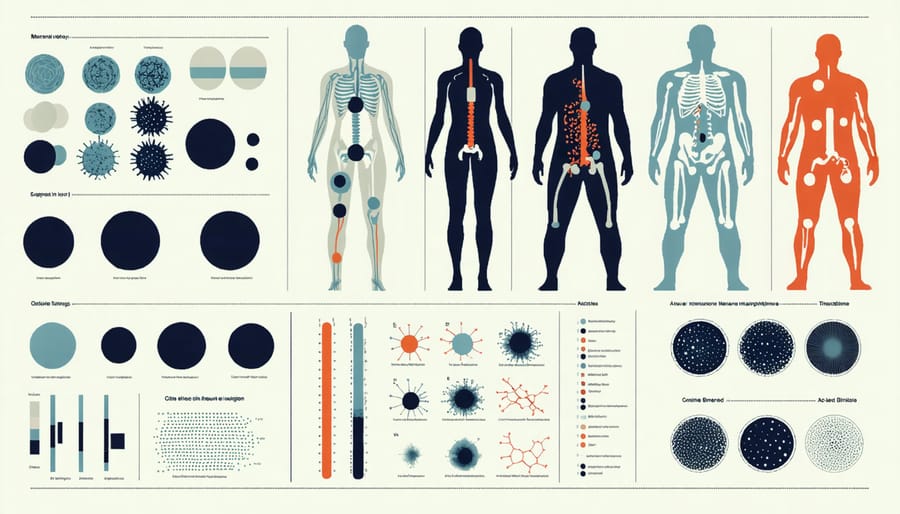Explore the potential benefits of incorporating HHC gummies into your transplant recovery regimen. Begin by consulting with your healthcare provider to assess whether HHC gummies are a viable option for you. Investigate reliable suppliers of these products, such as hhc edibles, to ensure quality and safety. Document your symptoms and recovery progress, noting any changes or improvements that occur with their use. Always prioritize adherence to your prescribed medication regimen while exploring complementary support from HHC gummies. By integrating these steps, you might enhance your post-transplant experience with informed choices.
Understanding Transplant Recovery
Physical Challenges
Transplant recovery is a journey marked by significant physical challenges. Patients often grapple with pain and inflammation following surgery, both of which can be exhausting and demand a lot from the body. Pain management becomes crucial, as it directly impacts a patient’s ability to heal and regain strength. Inflammation is another hurdle; it is the body’s natural response to surgery but can complicate the recovery process and potentially threaten the health of the new organ.
Moreover, maintaining a delicate balance in the immune system is essential. Transplant recipients must take immunosuppressive medications to prevent the body from rejecting the new organ. These drugs, while lifesaving, render the immune system less capable of fighting off infections, posing an additional layer of complexity and concern.
The journey doesn’t end at surgery; rather, it’s a continuous process of vigilance and care. Yet, amidst these challenges, there is hope, bolstered by advancements in medical science and community support, offering renewed life to many.

Emotional and Psychological Impact
The journey to recovery after a transplant can be emotionally and psychologically taxing for patients and their loved ones. It’s not uncommon for individuals to experience a mix of anxiety and depression during this time. The stress of adjusting to new medications and routines, coupled with the fear of organ rejection, can weigh heavily on a patient’s mind. Many find themselves grappling with a sense of dependency on others, which might lead to feelings of isolation or vulnerability. Family members may also feel a strain, navigating the fine line between providing support and maintaining their emotional well-being.
Incorporating supportive measures, such as therapy and support groups, can help alleviate these burdens by offering a safe space to share experiences and feelings. HHC gummies, emerging as a novel alternative, are being explored for their potential to soothe anxiety and depression during recovery. While research is still ongoing, personal stories highlight how these products may contribute positively to both emotional balance and overall quality of life, complementing traditional recovery approaches.

What Are HHC Gummies?
The Chemical Structure of HHC
Hexahydrocannabinol, or HHC, is a cannabinoid found naturally in hemp. Its chemical structure is similar to THC, but with added hydrogen atoms, making it more stable and potentially longer-lasting. While research is ongoing, early studies suggest that HHC may offer therapeutic benefits without the same legal restrictions currently associated with THC in many areas, making it more accessible for those seeking alternative recovery aids. As organ transplant recipients often face challenges in managing pain and inflammation, exploring options like HHC gummies can provide a sense of hope and empowerment, encouraging a collaborative approach to recovery.
Potential Effects and Benefits
Transplant recovery is a challenging journey, full of hurdles that extend beyond the operating room. HHC (hexahydrocannabinol) gummies are emerging as a promising complementary aid for individuals navigating this path. Through their potential benefits, these gummies may offer a new layer of support. One key benefit is pain relief, which is vital for transplant recipients who often face discomfort during recovery. By potentially lessening pain, HHC gummies can enhance overall well-being and facilitate a smoother healing process. Additionally, the calming effects of these gummies might promote relaxation, helping recipients manage stress and anxiety, both common after major surgeries.
Furthermore, HHC gummies are believed to possess anti-inflammatory properties, which can be particularly beneficial for reducing swelling and inflammation around the transplanted organ. This can contribute to a more stable recovery by mitigating some of the physical barriers that slow down healing. While more research is needed to fully understand their impact, the potential benefits of HHC gummies offer a glimmer of hope for patients seeking holistic recovery solutions. As always, individuals should consult with their healthcare team before incorporating new supplements into their post-transplant care regimen.
HHC Gummies in the Context of Transplant Recovery

Managing Pain and Inflammation
For many individuals recovering from an organ transplant, managing pain and inflammation is a crucial aspect of the healing journey. HHC gummies, derived from hemp, have emerged as a potential aid in this process due to their analgesic and anti-inflammatory properties. These gummies are thought to work by interacting with the body’s endocannabinoid system, which plays a role in regulating pain and inflammation. For instance, patients like Susan, who received a kidney transplant, have shared that incorporating HHC gummies into their recovery regimen helped alleviate lingering discomfort and swelling, allowing them to focus more on regaining strength and well-being.
The unique benefits of HHC gummies are underlined by emerging research that points to their potential in reducing neuropathic pain—a common challenge for transplant recipients. By potentially minimizing inflammation, these gummies might help lower the reliance on traditional pain medications, which often come with challenging side effects. It is important to approach the use of HHC gummies under the guidance of healthcare professionals, ensuring a safe and supportive recovery environment. As we explore new facets of care, these innovative therapies bring hope for a smoother healing process and highlight the progress made in improving transplant recovery outcomes.
Addressing Anxiety and Depression
Transplant recovery is a challenging journey, both physically and emotionally. For recipients, the burden of anxiety and depression can make this period even more daunting. HHC gummies offer a promising avenue for alleviating these mental health challenges, potentially easing the emotional landscape for those who have undergone transplant surgery. By interacting with the body’s endocannabinoid system, HHC may contribute to calming effects and mood improvement, similar to other cannabinoids. This can be particularly beneficial for transplant patients who may feel overwhelmed by the drastic changes to their lifestyle and health.
Consider the story of Emily, a kidney transplant recipient who experienced severe anxiety post-surgery. The fear of organ rejection and the stress of continual medical check-ups weighed heavily on her spirit. Incorporating HHC gummies into her routine, with guidance from her healthcare team, offered Emily a sense of relief and a more balanced emotional state. Her anxiety diminished, granting her space to focus on recovery and gradually reclaim her day-to-day life.
While research is still emerging, the potential for HHC gummies to support mental well-being in transplant recipients is encouraging. Always consult healthcare professionals before adding new supplements to ensure they align with personal health needs and recovery plans.
Current Research and Patient Stories
Research Findings
Recent studies have begun exploring the potential of HHC gummies as a supportive aid in the recovery process for organ transplant recipients. Early findings suggest that HHC, a hemp-derived compound, might offer benefits such as reducing inflammation and aiding pain management without the psychoactive effects typically associated with cannabis products. While research is still limited, anecdotal evidence from transplant recipients indicates that these gummies may help in managing some postoperative symptoms, allowing patients to focus on healing. Prospective studies aim to evaluate the long-term safety and effectiveness of HHC in this context, offering hope and new possibilities for a smoother recovery journey.
Patient Experiences
Recovering from an organ transplant is a journey filled with hope, resilience, and, at times, unexpected challenges. For some patients, the introduction of HHC gummies into their recovery regimen has been a source of comforting relief and improved well-being. Sarah, a liver transplant recipient from Ontario, recounts how HHC gummies provided her with a calming effect, easing her anxiety and supporting a smoother transition back to daily life. Similarly, James, who underwent a kidney transplant, shared that these gummies helped alleviate lingering discomfort during his recovery, allowing him to engage more comfortably in rehabilitation activities.
Stories like Sarah’s and James’ illustrate how a compassionate community forms around transplant recovery, uniting patients, families, and healthcare providers in search of holistic solutions. While individual experiences vary, these narratives highlight the potential of HHC gummies as part of a comprehensive recovery plan, offering hope and improved quality of life to those on the road to healing.
Considerations and Precautions
When considering HHC gummies for recovery after a transplant, it’s crucial to approach their use with caution. The effects of HHC, a cannabinoid, on transplant patients are not yet well-researched. Immunosuppressants are typically prescribed post-transplant to prevent organ rejection, and any supplement like HHC gummies could interact with these medications, potentially impacting their efficacy. Therefore, it’s essential for patients to consult healthcare providers before incorporating HHC gummies into their recovery plan. While some patient stories highlight various recovery aids, personal experiences can vary widely. Ensuring a personalized approach, guided by professional medical advice, remains vital in safeguarding health during the critical phase of transplant recovery.
Conclusion
HHC gummies show potential as an alternative aid in transplant recovery, possibly offering symptom relief and wellbeing support. However, more research is crucial to understand their effectiveness and safety fully. Personalized care remains essential, requiring collaboration with healthcare professionals to tailor recovery plans that best suit individual needs while considering new innovations.
